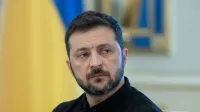Possible U.S. operation in Venezuela may aim to curb Russian, Chinese influence — analyst Horbach
global.espreso.tv
Tue, 04 Nov 2025 18:17:00 +0200

This was stated by Volodymyr Horbach, executive director of the Institute for the Transformation of Northern Eurasia, on Espreso TV.“There are several layers of perception. First, Donald Trump really needs some kind of small victorious war right now, as is often the case with politicians who are losing ground, facing difficulties, or struggling with a tense domestic situation in the United States. Starting with the shutdown and ending with Donald Fredovich’s unfinished or not very successful attempts at peacemaking on the international stage — for example, in negotiations with China, where the trade war issue has not been as successful, and may even have failed in some areas, compared to what Trump would have liked,” Horbach said.According to Volodymyr Horbach, Venezuela should be viewed not only as America’s “backyard,” but as part of the broader geopolitical arena on the American continent.“After all, this is the American continent. And drugs are indeed supplied to the United States — this is a real and persistent problem. Another matter is that it has never been resolved by such means as invading or occupying a country or territory from which drugs are supplied, often illegally and with numerous violations. These are excessive measures — a war or missile strikes against drug cartels,” the political expert explained.He noted that such an approach has traditionally been seen as an abuse of power and an overuse of force.“Trump needs to demonstrate strength because the Venezuelan regime of Maduro is closely linked not only to the Russians — to Vladimir Putin and his military-technical assistance to the Maduro regime — but also to China and Xi Jinping. This is all an attempt to rid America, Central America, and South America of Chinese and Russian influence, and to show who is in charge in this part of the world,” Horbach concluded.The political expert noted that such strikes on Venezuela could indeed occur in the near future, though several factors may delay them.“Another thing is that to start a war, Donald Trump needs to obtain authorization from Congress, which will be difficult for him to secure — at least until the situation with the shutdown is resolved,” Horbach explained.Commenting on statements from Russian officials, he added:“As for the Russian ‘Oreshniks’ or any other mythological threats — it seems that one of the State Duma members said they would send the ‘Oreshnik’ to help Maduro. This doesn’t really mean anything — you can’t send something that doesn’t exist just to prove it doesn’t exists. But the State Duma members can certainly afford to wave such verbal arguments around,” the expert said.Horbach noted that if it turns out Russia has indeed supplied the Maduro regime with dangerous weapons capable of striking American targets, the situation could escalate into a new Caribbean crisis.“Whether it’s ships or aircraft in the case of air defense, we could find ourselves back in a situation resembling the Second Caribbean War. The same processes could unfold — and with the same consequences for the Kremlin, by the way, as back then. Now it will be much easier to crush all these tentacles of the Kremlin in the Caribbean. Vladimir Putin no longer has the capabilities that Nikita Khrushchev had at the time,” the expert expained.Horbach emphasized that Venezuela could become the center of an unfolding geopolitical drama in the coming days and weeks.“Venezuela, as few people know, is the country with the largest proven oil reserves in the world — even greater than Saudi Arabia’s. But they are very poorly developed. For Donald Trump, this is also a serious argument to intervene in the situation, to remove Maduro’s regime through free democratic elections and bring to power a government sympathetic to him, which will allow American corporations to develop Venezuela’s natural resources — both onshore and offshore. This would significantly reduce oil prices and could completely drive Russian hydrocarbons out of the global market. I’m looking for some positive consequences that might result from this,” Horbach added.At the same time, he cautioned that this would also illustrate how powerful states act in their own interests, often with little regard for international norms:“It would be a demonstration of how large powers can pursue their goals without much concern for international law and all these conventions,” the expert concluded.According to Horbach, the key issue now is whether Nicolás Maduro’s regime will be recognized as legitimate.“Russia and China will recognize him as legitimate. The United States, on the other hand, may declare him illegitimate — especially since there were indeed very serious allegations of fraud in the last elections held there,” the expert explained.He noted, however, that Washington’s delayed reaction raises questions:“If you respond to this two or three years after the elections themselves, it naturally raises the question of why this was not done earlier. That is why the overall picture and the situation are so complex now,” Horbach concluded.On October 24, Venezuelan leader Nicolás Maduro addressed U.S. President Donald Trump in English, calling for “peace forever,” amid reports of U.S. troop deployments in the Caribbean.Shortly afterward, The Washington Post reported that Maduro had sent a letter to Russian dictator Vladimir Putin requesting military assistance in response to U.S. pressure. According to the publication, a Russian Il-76 military transport aircraft subsequently arrived in Caracas.On October 31, Trump denied media claims that he had already decided to launch strikes against military targets in Venezuela.However, on November 4, the U.S. president did not rule out the possibility of limited strikes on Venezuelan territory, while expressing doubt that such actions would escalate into a full-scale war.








